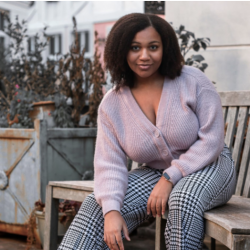The Daily sat down with Sierra Porter ’22, a Lyric McHenry Community Arts Fellow. Fellows work with organizations to promote social justice via art. Porter worked from Jun. 14 to Aug. 20 with The Fire This Time Festival, founded by playwright Kelley Girod in 2009. Its mission is to provide opportunities for African and African American playwrights to showcase various perspectives. Porter has previously worked with the Stanford Department of Theater and Performance Studies on productions, including “Godot Has Come” and “Revival.”
The Stanford Daily [TSD]: Prospective fellows have to indicate where they want to work in applying for the Lyric McHenry Community Arts Fellowship. Why did you specifically choose to work with The Fire This Time Festival?
Sierra Porter [SP]: In winter, I worked on StageCast with Michael Rau, who is one of the directors at Stanford; within this production was a play called the Loup Garou, written by Kelley Girod — she is the founder of The Fire This Time Festival. Michael was telling me such great things about her, how they met, how she was really influential in his artistic path — so I wanted to know more about her and about the festival, given he told me that might be a really good match for me. And so I looked into it, and I read about her work. And I was like, “Wow, this is amazing. This is definitely something I want to do, and be a part of, and contribute to.” And so I reached out to Kelley, and we met — and we were on such great energy.
TSD: Can you talk about your work and what you hoped to accomplish this summer at The Fire This Time Festival?
SP: The Fire This Time is a theater company that gives visibility to Black playwrights and to the entertainment industry, and so part of what I’m doing is trying to assist in the projects that they take on. Right now, we are partnering with CTG — Center Theater Group — and we are doing a thing called, “Not a Moment, But a Movement.” We are discussing the Black experience in America. This came up after 2020 with heavy, heavy anti-Black sentiment, a lot of racial violence and killing of Black people. That helps Black people and also the whole community to take a stand. To put on productions that reflect the sentiment that everyone’s going to protest and speak up about this issue, it wasn’t just a trend. It is a movement. It is long-term. And we want to stay in that movement by putting out art that provokes dialogue with people.
TSD: Can you give some specific examples of plays you worked on?
SP: The most recent one that came out is “The Duat.” We’re still virtual, so I have not gone anywhere. I was doing editing, giving critiques, criticisms before it went out, and then I worked on a handbook to discuss the accessibility measures being taken to make sure the theater is comfortable for everyone, as well as setting expectations, roles, just the general workflow of The Fire This Time. And I love the work, because it allows me to interview people, to get their experience, to know, “here are some things that maybe need to be changed,” or, “here are some things that really worked well.” That’s what I’m hoping to produce by the end of the summer.
TSD: One of the goals of the fellowship is to promote social justice with art — how do the plays you worked on contribute to that goal?
SP: We have been discussing systemic racism and how it prevails in just about all different aspects of life, including the entertainment industry. It’s very noticeable that you will not see as many dark-skinned women in plays, or that the plays that are being done by certain top names will be performed by a lot of white playwrights and not with people of color. Our point is to provide visibility to these Black playwrights and allow these Black stories to be heard. There is that little tag that people put sometimes on Instagram, where it says, “Black stories” in it. The work that we’re doing is giving these Black playwrights a chance to pursue their dreams, pursue the careers that they want — and for them to know that we believe in them. We know that they can do this.
TSD: What are some of your main takeaways? What have you learned from this experience?
SP: The art and entertainment industry has so much room to grow. There are really small measures that can be taken to be more inclusive of all people. It is recognizing that we are not perfect, recognizing that, “Hey, we as a company have some flaws. We as an industry have a lot of flaws.” And not being upset with ourselves, and being like, “Okay, how can we change them” — that is something I’m really into. An example: having a sign-language interpreter at a performance, something that can help people in the audience but is not necessarily for everyone — that is, making sure we’re making theater accessible to all people, including people with disabilities and people of marginalized identities.
The second thing: art cannot be forced. It wasn’t until this past week that I was able to get in the creative zone to actually write something. And it’s really tough because of being in New York City: There is a lot of movement — everything is moving really quickly. The weeks fly by, and I rarely had time to be still and ground myself. I had the chance to do that last week, and then the ideas were flowing. It’s really interesting how, when I didn’t expect it to happen, it happened. We all like to create, we all want to make art, but it happens in its own time. It shouldn’t be forced, because there’s beauty in the journey of getting to it.
